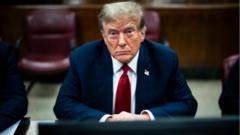20 minutes ago
About sharing
Donald Trump’s unprecedented criminal trial began on Monday with half of a group of potential jurors ruled out within minutes on impartiality grounds.
Mr Trump denies falsifying business records to conceal a hush-money payment to porn star Stormy Daniels.
Sixty of 96 potential jurors were quick to say in the New York court that they could not be impartial.
Those left were then asked multiple questions, including about their news and book reading habits.
“I just couldn’t do it,” one prospective juror was heard saying as she left court.
The dismissals were an indication of how challenging it could be to find a group of 12 impartial jurors for a case concerned with a high-profile sex scandal involving a former president running once again for the White House.
The Manhattan District Attorney’s Office alleges that Mr Trump directed his former attorney, Michael Cohen, to pay Ms Daniels $130,000 (£104,000) in exchange for her silence about an alleged sexual encounter that the former president denies took place.
Prosecutors say he did so to “unlawfully influence” the 2016 election. Mr Trump has pleaded not guilty.
Jury selection began in the afternoon. The judge started by dismissing jurors who raised their hand to say they could not be impartial, leaving around 34 people.
Those left were then grilled on 42 questions in the jury questionnaire, including on their news-reading habits, whether they had attended any Trump rallies or read any of the former president’s books.
Eighteen were placed at random in the jury box, and they answered the questionnaire one by one.
One man from Midtown Manhattan said that he read the Wall Street Journal. Another from the Upper West Side said his radio habits included listening to whatever was on when he was in the shower. He later clarified he meant NPR.
Neither was dismissed immediately.
A woman was asked: “Do you have any strong opinions or firmly held beliefs about former president Donald Trump, or the fact that he is a current candidate for president, that would interfere with your ability to be a fair and impartial juror?”
She simply replied “yes” and was dismissed, although Mr Trump’s team initially objected to excusing her.
All jurors will remain anonymous due to the high-profile nature of the case, although Mr Trump’s legal team and prosecutors will know their identities.
Quiet in the court
The accused stayed quiet during the day, speaking to his lawyers in a hushed tone while maintaining a stern expression. He said three words in the entirety of the morning to the judge, New York Justice Juan Merchan – all “yes”, when asked about what conduct was required in court.
But outside of the court, Mr Trump said the trial was “nonsense” and an “assault on America”.
Mr Trump’s public remarks about the case were the subject of several minutes of debate during the morning in court.
Prosecutors argued some of Mr Trump’s posts on his social media site, Truth Social, violated a gag order Justice Merchan imposed on him. The order bars Mr Trump from making public comments about people related to the case, including potential witnesses.
The order was expanded to relatives of those involved after Mr Trump attacked Justice Merchan’s daughter on social media.
The Manhattan District Attorney’s Office asked Justice Merchan to fine Mr Trump $3,000 (£2,400) in total for three posts. The judge set a hearing date of 23 April to make a decision.
The judge used the morning in court to resolve what evidence would be permissible in court.
The defence and the prosecution sparred over an infamous Access Hollywood Tape that came out just before the 2016 election. In the tape, Mr Trump talks about grabbing women by their genitals.
Prosecutors asked to include an email chain between Trump campaign officials and the Washington Post reporter who broke the Access Hollywood story, which included a transcript of the tape.
The judge said the emails would be allowed if “set up properly”, despite objections from Mr Trump’s legal team.
Throughout the day, Mr Trump was cheered on by dozens of people who rallied peacefully but loudly outside of court.
They included a man playing the Star-Spangled Banner on the flute for hours and a person imitating the former president wearing a blonde wig and red tie.
The were others decidedly less enthusiastic about the former president. One held a banner that stated: “Convict Trump already.”
The hush-money trial is just one of four criminal cases the former president is facing. But it could be the only one to go to trial before the 2024 presidential election, a rematch between Mr Trump and the incumbent, Joe Biden.
If convicted, Mr Trump would be the first major-party nominee to run for president as a convicted felon. No law prevents him from doing so.
Justice Merchan also rejected a defence request that Mr Trump be excused from the trial next Thursday so that he can attend Supreme Court arguments on the immunity claims he raised in another of his criminal cases.
“Arguing before the Supreme Court is a big deal,” Justice Merchan said, before adding: “A trial in New York Supreme Court … is also a big deal. I will see him here next week.”
2 days ago
7 hours ago
